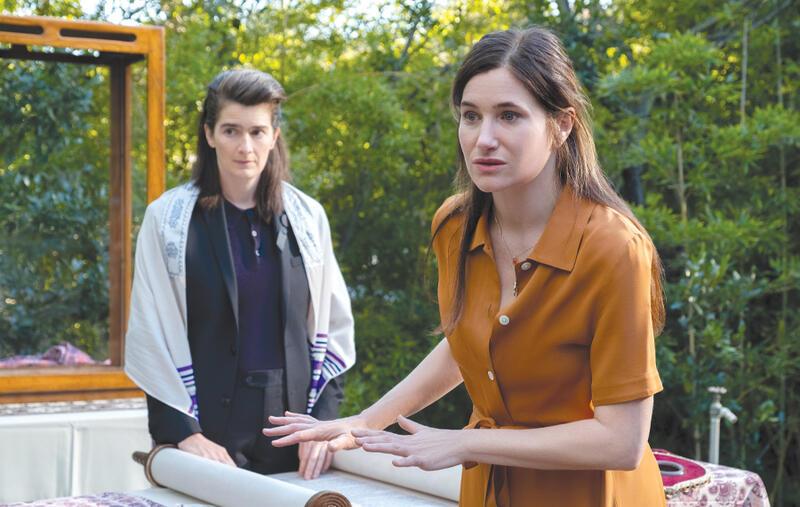Rabbi Raquel Has a Place in the “Hahnaissance”
According to New York Magazine, we’re currently in the midst of “The Hahnaissance,” a long-overdue celebration of character actress Kathryn Hahn’s enormous, scene-stealing talent. While Hahn is by no means “underrated”—she’s an Emmy and SAG Award nominee with dozens of standout film, TV, and theatre performances to her name—she often flies under the radar. But a very high-profile role on the very high-profile Marvel Cinematic Universe series WandaVision has catapulted the actor to new heights of fame. General audiences are finally taking notice of her acting chops, as indicated by the aforementioned career retrospective in NY Mag, and rediscovering her past roles.
The magazine’s list of Hahn’s best performances is comprehensive and thoughtful, but I was surprised by one glaring omission: her role as Rabbi Raquel on Transparent, which garnered Hahn her first and only Emmy nomination. Not only was Rabbi Raquel Hahn’s most award-decorated performance, it’s also the performance that best showcases her range.
Hahn shines as the slightly off-center heroine—a best friend in a rom com like How to Lose a Guy in Ten Days, a witch in a superhero series like WandaVision, a woman rabbi on Transparent. Like other character actors of her caliber, Hahn bestows her characters with a deep interiority. In less-adept hands, these women might be relegated to the latter half of the credits, out of sight and out of mind. Spiritual consultant characters like best friends, witches, and rabbis often spur the main character to revelation, but they often do not have minds and beating hearts of their own. They’re storytelling conventions, not real people. Hahn always gives her characters that Build-a-Bear acting treatment, though: turning words on a page into three-dimensional characters by stuffing them with equal parts craft, creativity, and that aforementioned, indescribable beating heart.
Many of Hahn’s best performances bring that depth to larger-than-life characters: messy, loud, hilarious women who are usually intimidatingly competent. I love Rabbi Raquel because she defies our expectations of a typical Hahn character; she’s competent, but not boastful. She’s funny, but rarely the center of attention. Her messiness is all inside—she’s a faith leader and teacher thrown off course when she falls in love with the emotionally immature Josh Pfefferman (Jay Duplass). A great Hahn performance is usually defined by impeccable, external comedic timing, but Rabbi Raquel is special because of her gorgeous internal processing style. She’s an active listener and a conversational sponge, soaking up vibrant, hyper-verbal energy from characters like the Pfeffermans. Rabbi Raquel builds relationships using nothing but her expressive face, whereas the Pfeffermans are the extroverted yin to her introverted yang. Those energies need each other to effectively communicate, and it’s fun to watch the usually verbose Hahn play with quiet.
In a 2017 interview, Hahn, who was raised Catholic, spoke with The Los Angeles Times about the intricacies of her Transparent role. “She’s a rabbi. You’re not going to close the door to anybody that is asking for spiritual guidance of any kind, no matter who they are. It would go against everything she believed in,” she said. “And I think there’s something so seductive about any of those Pfeffermans who are so charismatic. Even though there’s a big part of her [saying] ‘Danger, danger!’ She couldn’t help it. And of course her gut was proven right by the end of it.”
I understand, culturally, why we’ve stopped talking about Transparent. Jeffrey Tambor, the cis man who played main character Maura Pfefferman, a transgender woman, was called out as an abuser during the initial wave of #MeToo accusations in 2017 (with claims specific to the production of Transparent). In the aftermath, Transparent slowly vanished from our collective consciousness, with Tambor’s alleged behavior a permanent stain on a once-acclaimed show.
I do think it’s a shame to let the whole series—and Hahn’s incredible performance—fall by the wayside. The show was politically imperfect, and the set environment was clearly nightmarish for many of the marginalized cast and crew. But Transparent was a stepping stone on the path to greater, more nuanced depictions of trans women on television, and a wake-up call for an industry that so frequently celebrates outward-facing diversity while failing to build the infrastructure necessary to keep marginalized people safe at work.
Transparent also provided the most honest portrayal of millennial, secular Judaism I’ve ever seen on television. The show is extremely Jewish. During my first watch, I occasionally had to pause the show to call my parents and tell them about a conversation that just transpired on screen that could have been taken word for word from one of our family dinners. The Pfefferman family’s bond was equal parts deep and concerning, intense and familiar. They cooperatively overlap in their speech, and overstep each other’s boundaries, and have very personalized relationships to God and religion.
When the Pfeffermans meet Rabbi Raquel during season one, they forge an instant connection. Josh, the self-described “love addict,” almost fetishizes Raquel’s faith and stability when they find themselves in a romantic relationship.
While romantically involved, Josh and Raquel quickly experience several traumatic incidences all at once—including Raquel getting pregnant and suffering a miscarriage.
A miscarriage is always a tragedy, but this particular miscarriage also, devastatingly, reveals what Josh and Raquel really thought of each other. Raquel, who immediately wants to try for another baby, was very much in love with Josh; Josh, who suggests they just take it slow after the whirlwind pregnancy and miscarriage, was very much in love with the idea of being in a steady, long-term, settled-down relationship with a someone like a rabbi—someone stable and committed.
With the series left in limbo following the allegations against Tambor (which coincided with the end of the fourth season), fans were left to wonder for two years about what would become of the Pfeffermans. We were not left without lessons to consider—during the break, I had a lot of time to think about the ethics of representation (on a macro level) and the tragedy of Raquel and Josh (on a micro level). Raquel and Josh could never really work, I thought, because Raquel’s devotion contrasted with Josh’s insecurity. People who are ultimately not looking for the same thing cannot possibly end up together.
Then, Transparent returned for a feature-length musical series finale, sans Tambor. The Pfefferman family said goodbye to Maura, and audiences had the chance to watch the characters—and the actors—grieve and move on from that complicated connection. The musical format allowed characters the space to express themselves in ways they typically wouldn’t. Rabbi Raquel gets a sexy jazz number, “Sit In It,” where she addresses the power imbalance central to her relationship with the Pfeffermans. This is prime Hahn: big, brassy, and extroverted.
There’s an old theatre adage that goes: Characters sing when their emotions are so big they can no longer be communicated simply through words. “It takes a lot of me. That’s what Rabbis do,” Raquel sings, traipsing around the room in a skin-tight dance costume. “Sitting in the feelings of everybody else, and you’re running from your feelings until you’re chasing yourself into the middle of nowhere.”
Here, Raquel acknowledges what audiences know from Hahn’s performance and what the self-centered Pfefferman family has probably never considered: that rabbis, therapists, friends, and caretakers of any kind are only human. You can call upon these people for guidance, but you will never move forward until you are personally able to “sit in it”—“it” being your anger, your frustration, your grief. Raquel and Josh reconcile at the end of the series because Josh finally sits with his pain (literally sitting shiva for his parent) and learns from the experience without leaning on Raquel to do the work for him.
Raquel’s happy ending is predicated on her finally expressing herself in a way that puts her feelings front and center, and Kathryn Hahn was tailor-made to find that third dimension in characters who typically exist on the periphery. That’s her superpower; she finds the human being underneath the stereotype. Though Raquel is not as big or flashy a role as some of the genius, comedic turns on that NY Mag list, she’s the one that’s most complex and compelling. Best friend, witch, or woman rabbi, Kathryn Hahn is going to show you a real person, and Rabbi Raquel is no exception. She deserves her place in the Hahnaissance.








Thank you, thank you, someone finally wrote about Kathryn, her throughly fabulous, character Avd performance on Transparent, I think you have put all my thoughts into words Abd comments. I was a huge fan of the seri star Avd when it was gone fir a couple of years with no culmination, I was very disappointed. It was one of tge best Abd most prevelent shows in a long time.. Avd never had I felt so close to my faith in television before. But as the universe turns I Hear they will do a finale.. and how tge world turns my son Jeff is tge production coordinator! Cant get better.tge finale was extraordinary for t.v. Unfortunately because Wgat had happeved , tge show got little acknowledgment.. thank you for putting this into tge records book
This is an amazing, in depth article that captures me to the extent that I want to watch all of Kathryn Hahn's performances, although I never heard of her before reading this.
The article itself is so deep that it pulled me into knowing an actress whom I have never seen nor heard of. What an amazing job.